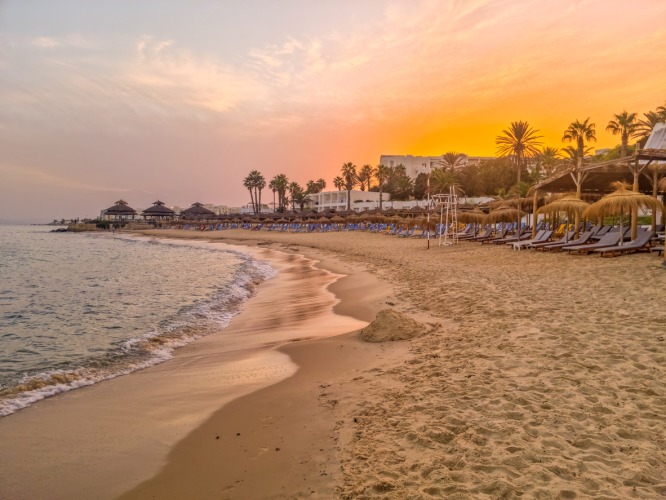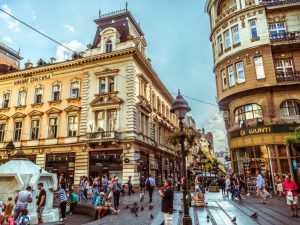 Tunisia : Safety by City
Tunisia : Safety by City
Tunisia - safety as a country Located in the Nabeul Governorate of Tunisia, Hammamet is a popular seaside town known for its beaches, watersports, and swimming.
The city is one of the top tourist destinations in the country and is popular with international and domestic visitors.
The locals are generally friendly, welcoming, and respectful to travelers, especially women.
However, the culture does allow for catcalling and other forms of harmless street harassment, which can become overwhelming.
Despite the city’s safety, typical precautions like being wary of overly friendly strangers and not roaming around alone at night should be implemented.
Trustworthy transportation services, like buses and inexpensive taxis, are safe, even late at night.
If you’re interested in visiting this gem of a destination then it’s important to understand the warnings and dangers, the safest places to visit and those to avoid, safety tips, and other useful information.
Keep reading to learn more!
Warnings & Dangers in Hammamet

OVERALL RISK: LOW
Hammamet and Tunisia as a country are relatively safe, but it’s important to report suspicious behavior and be aware of your surroundings at all times. Take the proper precautionary measures to minimize the risk of an incident occurring, and you will have a wonderful trip to a beautiful, and culturally rich country.

TRANSPORT & TAXIS RISK: LOW
Public transportation is typically safe in the city with well-connected taxi and bus systems. Taxis are fairly inexpensive, readily available, and metered. Bus service provides excellent city coverage, reaching even the furthest areas of the city and is generally safe. However, it’s important to always remain vigilant, especially during peak hours and try to have exchange change available to avoid any issues and delaying the other passengers.

PICKPOCKETS RISK: LOW
Unlike many other developing cities, visitors to Hammamet experience low incident rates of purse snatching and pickpocketing. Despite the low risk, this doesn’t mean you should let your guard down and not take the same precautions when visiting anywhere else. It’s always advisable to keep a low profile and attempt to blend in to avoid attracting unwanted attention. This means, don’t show off expensive jewelry or watches, and don’t flash cash in public.

NATURAL DISASTERS RISK: MEDIUM
Given its coastal location, Hammamet is subject to extensive flooding during the winters when rain is prominent. Drought is not a problem in the northern part of the country but can be a major issue in desert cities. Also, Tunisia sits in a seismically active zone, so earthquakes are common. It’s best to listen to the local authorities’ instructions if a natural disaster occurs.

MUGGING RISK: LOW
The risk of mugging and kidnapping in Hammamet is low. However, near the Libyan and Algerian borders, the mugging and kidnapping risks are high. It’s important to always remain vigilant, especially at night, and don’t wander down dark and desolate streets. Following these tips will ensure safety during your stay in Hammamet.

TERRORISM RISK: LOW
Unlike neighboring Algeria and Libya, which have extensive terrorist problems, the probability of a terrorist attack in Hammamet and across the country is low. The Tunisian Authority is constantly alert and ready to act on a suspected terrorist. With that being said, you must always remain aware of your surroundings, avoid public gatherings and protests, and report suspicious behavior to the local police.

SCAMS RISK: MEDIUM
Like other North African cities, street vendors are plentiful, especially in the main tourist areas. If you entertain their goods, watch out for the vendors attempting to overcharge and rip you off. Also, double-check the authenticity of every product you wish to purchase, check your change, and negotiate all prices in advance.

WOMEN TRAVELERS RISK: MEDIUM
Hammamet is a safe destination for female travelers. However, like with all locations, exercise caution, especially if walking around alone at night. Crime incident rates are not high against women, but they occur, so it’s best to travel using a reliable taxi service at night. Also, wearing modest clothing helps avoid unwanted attention while respecting the local culture and customs. Finally, always remain in populated, well-lit, tourist areas as an additional precaution.

TAP WATER RISK: MEDIUM
Although Hammamet’s tap water is chemically treated and should technically be safe, travelers recommend drinking bottled water. Local residents drink directly from the faucet since their bodies are used to the treated water. However, visitors often experience stomach issues due to the chemical differences compared to their home country's water supply and standards.
Safest Places to Visit in Hammamet
Just about all areas of Hammamet are safe during the day and at night while taking the proper precautions.
Hammamet is a highly policed city to protect visitors from issues.
Yasmine Hammamet is a specifically built tourist resort with excellent security.
However, many street vendors are in the area selling every item you ever wanted.
They can be a little pushy and aggressive at times but not violent or dangerous.
The marina also has plenty of shops and is incredibly safe, but it has annoying and persistent vendors.
A simple no or no thank you is sufficient.
The Promenade is also a great shopping and eating destination and safe at night due to excellent police protection.
Places to Avoid in Hammamet
Due to the excellent police presence in all areas of Hammamet, there is no place to avoid when visiting this beautiful destination.
However, it’s important to be cautious at night, like any other international location.
This means not wandering down unpopulated, dimly lit streets or into abandoned neighborhoods.
Given that taxis are so inexpensive, most travelers to Hammamet recommend hailing a cab at night if your accommodation is not close.
Other regular precautions exist like not withdrawing money at an outdoor ATM at night or flashing expensive items in public.
Safety Tips for Traveling to Hammamet
- Avoid Demonstrations. In all countries, it’s advisable to avoid demonstrations, protests, or large unplanned public gatherings. Although these events may appear friendly and welcoming, they often turn violent and chaotic. Since this isn’t your fight, there is no point in being involved. If you come across a large gathering, simply find another route to your destination. Do not walk through the crowd.
- Avoid Dimly Lit Areas. While this may seem like common sense in any location, it’s important to emphasize not to walk through poorly lit and unpopulated areas, especially at night. Criminals are often lurking in the shadows, waiting for an unsuspecting tourist to appear. If you find yourself in an abandoned area, calmly turn around and go back the way you came to avoid conflict.
- Avoid Eating in Public During Ramadan. Respecting the local cultures is important when leaving your country. During Ramadan, fasting is common from April to May when locals cannot eat from sunrise to sunset, so it’s incredibly rude to eat outside in public when others are hungry. While this is not necessarily a safety issue, it’s better to blend in with the crowd and follow the local customs if you’re traveling to Hammamet during Ramadan.
- Don’t Travel Near the Borders. Most Western state departments don’t recommend that visitors travel within 10 miles of the Algerian (west) and Libyan (east) borders due to ongoing terrorist activities. Although Hammamet is far from any international borders, it’s not advisable to travel close to these locations. Terrorists have been known to mug or kidnap international tourists who do not follow this guideline, so it’s crucial for your safety.
- Don’t Wander the Streets at Night. While the tourist areas in Hammamet are well-guarded and protected, it’s advisable not to explore much further than the popular areas of the city at night. Crime is lower in Hammamet than in most other Tunisian cities, but it’s still a best safety practice. If you are planning to be out late, taxis are plentiful and inexpensive, so it’s best to just hail a cab if you are far from the destination.
- Dress Conservatively. “When in Rome, do as the locals do.” This quote is applicable to any country you visit. The goal is to blend in and not draw attention to yourself. Women should keep their shoulders covered and wear long dresses when in public, especially at religious sites. Shorts are uncommon except at the beach, so men should wear long pants or jeans, regardless of how hot it is outside. Drawing attention to oneself screams that you are a tourist, so opportunistic criminals may take advantage.
- Monitor Local Media. It’s always important to remain updated on local events ranging from protests and demonstrations to weather and natural disasters. Each day, check the local activities while eating breakfast, so you know what to expect for the day and where not to visit. Since Hammamet is a tourist town, there are a few activities that you should be aware of, but situations change quickly in developing countries and it’s important to be prepared.
- Purchase Comprehensive Medical Insurance. Travel insurance often includes various types of medical coverage. When visiting Tunisia, it’s crucial to have this insurance to financially protect you from any issues, especially if you plan to venture outside of Hammamet. If you are in a remote area where hospitals or medical facilities are unavailable, travel insurance provides a stipend for airlifting medical emergencies to a hospital.
- Remain Hydrated. Hammamet and all areas of Tunisia can become incredibly hot during the summer. Even if you are on the coastline sitting on a beach, it’s crucial to remain hydrated at all times to avoid dehydration and related complications. Additionally, since the sun is so hot, applying a high SPF suntan lotion is necessary, even if you are just wandering around for the day. Make sure to be prepared with water, suntan lotion, a hat, and other safety items, regardless of where you’re visiting.
- Skip Staying Overnight Outside of Hammamet. Although Hammamet is a relatively safe city, some areas of the countryside are not, with bandits and terrorist organizations roaming the area. If you must stay outside of the city, then ensure it’s with a local or an international hotel brand with excellent security.
So... How Safe Is Hammamet Really?
In general, Hammamet is a safe city to visit, assuming you take the normal precautions of being vigilant, not wandering in abandoned areas, and using common sense.
If an area feels unsafe, then it’s best to leave that section of the city.
Since Hammamet is a tourist city due to its resorts and beaches, there’s plenty of round-the-clock police protection, so you should feel safe and visit this beautiful destination.
How Does Hammamet Compare?
| City | Safety Index |
|---|---|
| Hammamet | 78 |
| Djerba | 53 |
| Tunis | 59 |
| Sidi Bou Said | 42 |
| Bab Bhar | 56 |
| Mahdia | 32 |
| Kairouan Medina | 52 |
| Rio de Janeiro (Brazil) | 43 |
| Sofia (Bulgaria) | 73 |
| Siem Reap (Cambodia) | 63 |
| Phnom Penh (Cambodia) | 61 |
| Niagara Falls (Canada) | 87 |
| Calgary (Canada) | 82 |
Useful Information

Visas
Many countries, including Western countries in Europe, the United States, and Canada, don’t require visas to enter. However, passports must be valid for the entire duration of your visit. If you’re unsure of your visa status, then it’s advisable to check with your local State Department to confirm requirements before booking a flight.

Currency
The country’s official currency is the Tunisian Dinar. Interestingly, visitors cannot take Tunisian currency out of the country. When changing money, Tunisian banks will request to see your passport to confirm citizenship. If you don’t wish to exchange money, there’s plenty of ATMs scattered around Hammamet and international brand stores, hotels, restaurants, and other establishments take credit cards.

Weather
Since Hammamet is situated on the eastern coastline of the country, the area enjoys a hot, dry summer Mediterranean climate with mild winters comprised of rainfall. Temperatures in July and August regularly exceed over 100 degrees Fahrenheit. This might be too hot for visitors from cooler climates, so traveling to Hammamet in the Spring or Fall might be a better option.

Airports
The closest airport is Enfidha-Hammamet International Airport, which is approximately 25 miles from the city center. Most visitors take a private shuttle or taxi from the airport to Hammamet, which takes approximately 45 minutes. Many opt to fly into Tunis Carthage International Airport, which is only around a one-hour drive, depending on traffic. Tunis is the capital of Tunisia and a much larger city, so ticket prices might be more reasonable.

Travel Insurance
When visiting any foreign country, it’s important to purchase travel insurance. In addition to covering lost or delayed luggage, travel insurance also pays for flight cancellations and other delays and medical coverage. Also, if you need to be airlifted to a hospital from a remote area, travel insurance financially protects you from massive medical bills.
Hammamet Weather Averages (Temperatures)
Average High/Low Temperature
| Temperature / Month | Jan | Feb | Mar | Apr | May | Jun | Jul | Aug | Sep | Oct | Nov | Dec |
|---|---|---|---|---|---|---|---|---|---|---|---|---|
| High °C | 16 | 16 | 18 | 20 | 24 | 28 | 31 | 31 | 28 | 25 | 20 | 17 |
| Low °C | 9 | 9 | 10 | 13 | 16 | 19 | 22 | 23 | 21 | 18 | 14 | 10 |
| High °F | 61 | 61 | 64 | 68 | 75 | 82 | 88 | 88 | 82 | 77 | 68 | 63 |
| Low °F | 48 | 48 | 50 | 55 | 61 | 66 | 72 | 73 | 70 | 64 | 57 | 50 |
Tunisia - Safety by City
| City | Safety Index |
|---|---|
| Bab Bhar | 56 |
| Djerba | 53 |
| Hammamet | 78 |
| Kairouan Medina | 52 |
| Mahdia | 32 |
| Sidi Bou Said | 42 |
| Sousse | 48 |
| Tunis | 59 |











